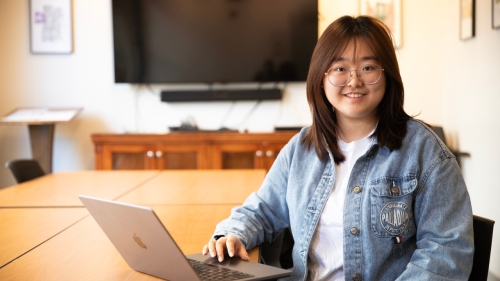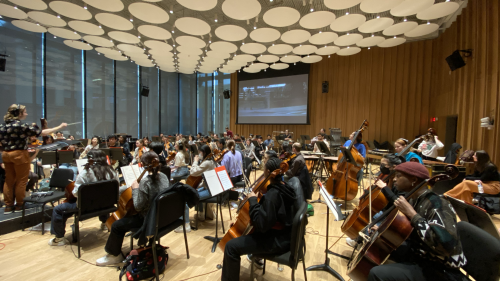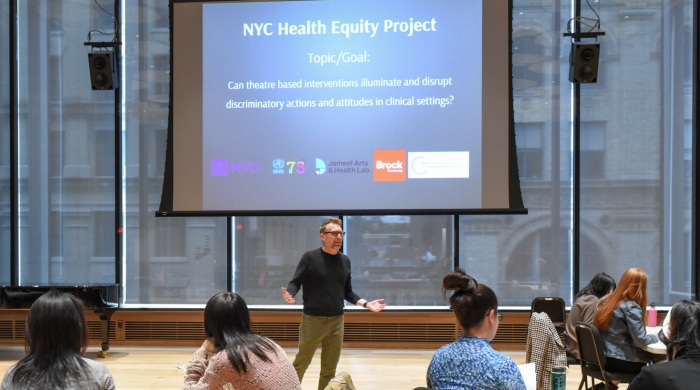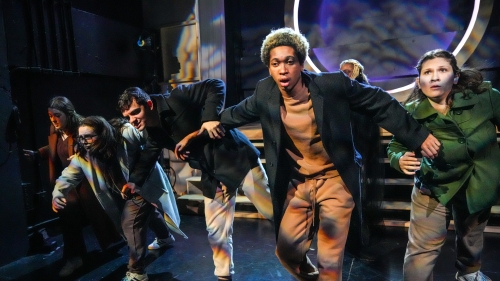Olivia Qian and other NYU undergraduate students are gaining meaningful lab and field experience long before grad school.
Few of the students profiled in NYU News' article about undergraduate research started college with the idea that they’d soon be working side by side with professors and PhD candidates. But where their academic curiosity led, opportunities followed—and many were surprised to find what doors opened to them when they took initiative and moved their exploration beyond the classroom.
For NYU undergraduates interested in research, gaining this kind of experience—in the field, the lab, or the studio—can take several forms, ranging from assisting a faculty or grad student mentor to embarking on independent projects and even co-authoring publications along the way. The Office of the Provost connected NYU News with NYU Steinhardt Educational Theatre student Olivia Qian. You can also read more about other NYU undergraduate researchers focused on VR, engineering, economics, engineering, and biochemistry.

Photo by Jonathan King. Courtesy of NYU News.
Olivia Qian
Major: Educational Theatre
Project: That’s Not a Partisan Feeling, That’s Patriotic
Mentor: Joe Salvatore, Clinical Professor of Educational Theatre, Vice Chair for Academic Affairs, and Founder and Director of Verbatim Performance Lab (VPL)
In the VPL, we create documentary theatre performances that disrupt political, cultural, and social narratives through dialogic and participatory experiences. We have different projects each semester, with research questions that we want to answer through the performances.
Often that involves interviewing people. During the interview, we do not interrupt the subjects—we respect the full answers because we want their organic response. Then we study their words and gestures and create a transcript that replicates them exactly. For example, when we hear a pause, we use a hard return on the keyboard. When we bring in actors to perform the transcripts, sometimes we will flip the race or the gender or the person speaking, to see how that impacts audiences’ perceptions of their words.
Our main project this semester, That’s Not a Partisan Feeling, That’s Patriotic, is an interview-based work focusing on the 2024 presidential election. It’s meant to lead audiences to a better understanding of what people living and working in the United States expect from a president. We have a large age range represented, from 18 to 89 years old, and it’s interesting to hear their differing opinions about political parties.
I did interviews for it and have also been working within our database to classify the transcripts into different categories. The theme for one of our performances is states, so we let the audience select which states they want to hear from.
One thing I find fascinating is that we hear a lot of news coverage on data about voters’ opinions of the candidates’ positions on major issues—the economy, foreign policy, anything. But when I was doing interviews and reading transcripts, I found that most people are talking about their rent or their loans and other things that influence their day-to-day lives. Maybe they don’t care as much about the presidential election as about local government and the leaders who will do something about those smaller, everyday things. If you don’t talk to people and you’re only thinking about the big issues, you don’t hear that.
Since I was young, I loved theatre, even though I didn’t have much of an opportunity to perform in my rural village in China. At some point, I decided I wanted to be a teacher, and volunteered with a local school. I had planned to teach math and literature, but the principal told me that the children there were at risk of getting hit by cars because they didn’t know how to read traffic lights. So I used theatre games as a tool to help them learn to recognize the traffic lights. That’s when I realized I wanted to combine education and theatre together for a career.
Since working with Professor Salvatore in the VPL, I’ve grown as a critical thinker. Previously I didn’t share my opinions, because I thought people wouldn’t have any use for them. But in this Lab, we sit at a round table, and everybody is asked to share their ideas. My opinions are respected and used. I’ve also been thinking differently about my career. I had thought that what I wanted to do was to teach theatre, but I’ve been thinking more about how theatre itself has teaching power, depending on how we structure a performance and what tools we use to prompt audience reactions.
Related Articles
NYU Celebrates Constitution Day with Debut of Verbatim Performance Lab Piece
"That’s Not a Partisan Feeling, That’s Patriotic" portrays real-life interview subjects’ complex thoughts on the role of the U.S. president.
Steinhardt Marks 60th Anniversary of Free Speech Movement
NYU Steinhardt will host a range of events to commemorate the 60th anniversary of the Free Speech Movement—a semester-long student rebellion that erupted at the University of California, Berkeley, in the fall of 1964.
Using Theatre to Confront Healthcare Discrimination in NYC
The NYC Health Equity Project’s recent workshop explored how theatre can help change discriminatory attitudes and actions in healthcare.
Related Programs
Related Department

Music and Performing Arts Professions
35 W. 4th Street, 2nd Floor
New York, NY 10012
212-998-5424
mpap@nyu.edu



